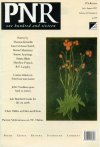This article is taken from PN Review 116, Volume 23 Number 6, July - August 1997.
American NarcissismThat the story of Narcissus has proposed itself as focus of contemporary meditation owes something to its concerns and something to its nature: like much contemporary fiction, it is all psychology, no narrative. Impossible to film. As a static image, it encourages projections of the kind narrative limits or interrupts. As an image concerned with the self's engagement with the self, it falls quite naturally in line with one of our century's engrossing discoveries, psychoanalysis. Further, it adopts and extends Romanticism's attentiveness to the soul, or the inward.
The soul, here, is entirely hostage to the body. In Ovid's telling, the beautiful cold boy, whom love never moves, sees in the pond what others see, the depth of the water compensating for the superficiality of the reflection. His punishment is to suffer what has been suffered in his name: he also falls in love, his love as conscious and as doomed as Echo's. He knows what he's looking at: 'Alas! I am myself the boy I see. I know it… I am on fire with love for my own self.' He endures, until grief claims him, the knowledge of his passion's impossibility.
Still, this is for Narcissus the discovery of love, of feeling. Yet within the still parabolic shape of the story, and end, a constriction as well as a beginning. Echo, spurned, is deprived of her body; Narcissus loses his life. Although the punishment devised by Nemesis initiates lucid apprehension, it is the sense ...
The page you have requested is restricted to subscribers only. Please enter your username and password and click on 'Continue'.
If you have forgotten your username and password, please enter the email address you used when you joined. Your login details will then be emailed to the address specified.
If you are not a subscriber and would like to enjoy the 282 issues containing over 11,400 poems, articles, reports, interviews and reviews, why not subscribe to the website today?
If you have forgotten your username and password, please enter the email address you used when you joined. Your login details will then be emailed to the address specified.
If you are not a subscriber and would like to enjoy the 282 issues containing over 11,400 poems, articles, reports, interviews and reviews, why not subscribe to the website today?




